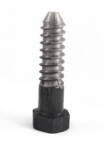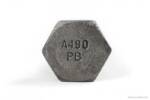Portland's FAQs
The reference to “Grade 55” is for getting a stainless steel all thread rod with a minimum yield strength of 55,000 psi. There are currently no stainless steel specifications commonly stocked that will guarantee a 55,000 psi yield strength. The most commonly stocked grades of stainless all thread rod are A193, A320, and F593. The... Read more
This is a term that is frequently used across the industry. More often than not, “bridge washers” will refer to cast iron malleable iron washers. These washers are typically used in dock and wood construction. Malleable iron washers are specifically designed to prevent bolt heads and nuts from pulling into the wood. Detailers will also... Read more
The A153 specification has 4 classes of material for hot-dip galvanizing: A. Castings – Malleable Iron, Steel B. Rolled, pressed, and forged articles C. Fasteners over 3/8” in diameter, washers 3/16” to 1/4” thickness D. Fasteners 3/8” inch in diameter and under, washers under 3/16” thick F2329 was created out of A153 to further define the... Read more
Even with the new F3125 specification that covers A325, Portland Bolt would not manufacture lag screws to F3125 Grade A325. According to section 1.2.1 under Intended Use in ASTM F3125, “Bolts manufactured under this specification are intended for use in structural connections covered in the Specification Joints Using High-Strength Bolts, as approved by the Research... Read more

Unfortunately, Portland Bolt cannot manufacture fasteners with Unified National Fine threads. UNF thread series bolts are typically used in precision applications, such as automotive or machinery. Our threading equipment is unable to hold the required thread tolerance for UNF. Also, unlike cold-drawn steel, the hot rolled round bar we use to manufacture construction fasteners does not lend itself... Read more
A193 is an ASTM (American Society for Testing and Materials) specification, whereas SA193 is from ASME (American Society of Mechanical Engineers). ASME repurposed the ASTM specification and added an “S”. The primary difference is the application. While both specifications are designed for high temperature / high pressure service, SA193 may also be used in nuclear... Read more
ASTM A687 was withdrawn in 1999. The specification covered high-strength non-headed steel bolts and studs. Below are the mechanical properties as well as Charpy Testing requirements: Yield Strength (KSI) Tensile Strength (KSI) Elongation % Reduction of Area % Foot-Lbs (Ave-min) Temperature 105 Min. 150 Max. 15 Min. 45 Min. 15 -20F While it is possible... Read more
No they do not. F1554 is a carbon steel, carbon boron, alloy, or high-strength low-alloy specification. F1554 has 3 strength grades, 36, 55, and 105. These numbers correspond to the minimum yield strength required. If corrosion resistance is required, F1554 anchor bolts can be hot-dip galvanized to the F2329 specification. If weathering steel anchor bolts... Read more
The short answer is, “No, you cannot match the A325 strength with stainless steel.” Some grades of strain hardened or quenched and tempered stainless steel fasteners will exceed the A325 strength requirements, but most standard stainless fasteners are not nearly as strong as A325 bolts. These bolts are very different chemically. Whereas stainless steels consist... Read more

ASTM F3125 Grades A490 and A325 structural bolts are mass-produced through 1-1/4” diameter. However, there is an exception for 1/2” A490 bolts. Compared to other diameters, these are not commonly used. Therefore, 1/2” diameter A490 bolts are not mass-produced and are not readily available in the marketplace. There are a couple of ways to work around this. First,... Read more

